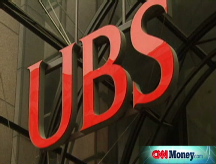Dollar gains as economy stumbles
Investors seek the shelter of U.S. currency as reports show manufacturing weakness.
NEW YORK (CNNMoney.com) -- The dollar gained slightly against the 15-nation euro Thursday as finance and manufacturing sectors continued to slow, despite government efforts to reinforce the economy.
The U.S. dollar and the euro are usually considered to be stable investments in times of uncertainty, and they are stockpiled by many nations as a reserve currencies. However, investors have been favoring the dollar due to the spreading economic crisis in euro-zone nations.
During Thursday's trading, the euro fell 0.06 cents to $1.3417, from $1.3424 late Wednesday. The dollar rose against the Japanese yen, buying ¥100.75 from ¥99.87 the day before, but sank against the British Pound, which rose to $1.7223 from $1.7195.
U.S. weakness: In the United States, steep losses at Merrill Lynch (MER, Fortune 500) and Citigroup (C, Fortune 500), coupled with two reports showing a massive drop in manufacturing activity, caused the Dow Jones industrial average to drop by 268 points after just two hours of trading, but most of those losses were recouped in early afternoon trading.
Citi and Merrill, which is in the process of being purchased by Bank of America (BAC, Fortune 500), both reported billions in losses for the third quarter due to steep credit and mortgage-related writedowns.
A Federal Reserve report showed that September U.S. factory production had fallen 2.8% after Hurricanes Gustav and Ike ravaged industries along the Gulf Coast - the largest drop in 34 years.
Also, a report released Wednesday by the Commerce Department showed a 1.2% decline in retail sales for September, the third month in a row that sales have fallen, and the biggest drop since 2005.
"The data yesterday and today are really putting the onus on the U.S.," said Dustin Reid, senior currency strategist at ABN Amro in Chicago.
European troubles: Economic weaknesses also hammered Europe as stocks in France, Germany and London plummeted.
French president Nicolas Sarkozy, speaking at a summit in Brussels, Belgium, called for international help in propping up Europe's manufacturing businesses.
Like the United States, European countries have been taking drastic actions to keep businesses from failing and bail out banks.
On Thursday, Switzerland said it would inject the Swiss franc equivalent of $54 billion into its international banking system, which includes financial giant UBS AG (UBS).
"It's difficult to tell whose worse off," said Reid, but pointed out that investors were continuing to favor the dollar due to the Federal Reserve's early actions to combat the subprime lending crisis several months ago.
"At this point I would say that the Fed cut rates so aggressively, while the ECB has been relatively [unmoved]," he added.
Eventually dollar trading may become dominated by two opposing camps, according to Reid: Those who buy the dollar as a safe haven investment, and those who want to sell the dollar due to economic weakness in the United States.
Oil prices: The rising dollar has also drawn a lot of investment funds out of oil futures.
As the economy slows, commodity investors have been worried about falling demand for fuel. And since oil is traded in U.S. dollars, a decline in oil prices makes the dollars themselves a much more attractive investment.
Credit recovery: Even as investors flee from falling equity investments, U.S. and international efforts to unstop the credit markets and encourage banks to pump money through the global economy appear to be working.
The overnight bank-to-bank lending rate, known as Libor, fell to 1.94% from 2.14% Wednesday, according to Bloomberg.com. The higher the rate, the more expensive and difficult it is for banks to lend money. Just a week ago, the rate was at 5.09%. ![]()




